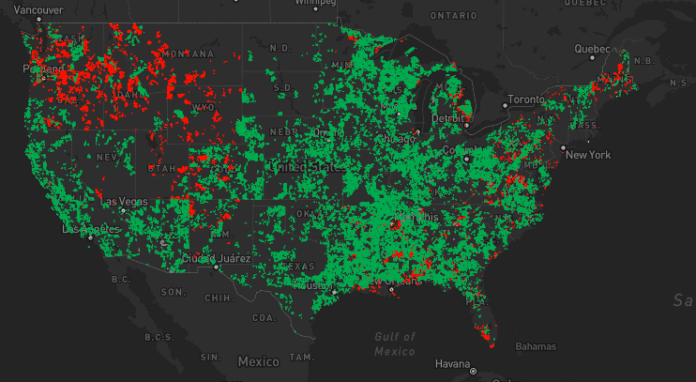The Rural Digital Opportunity Fund auction has wrapped up, setting the stage for $9.23 billion in subsidies to be doled out over the next decade in support of high-speed rural broadband deployment.
That deployment will come as a combination of wireline, fixed wireless and space-based internet service, as Elon Musk’s SpaceX has won nearly $886 million in support of its low-earth-orbit satellite service, Starlink. Starlink recently opened up its “Better Than Nothing” beta testing to the public, with start-up equipment costing about $500 and a monthly fee of $99 for service that tells users to expect speeds varying between 50 Mbps and 150 Mbps, with latency between 20-40 milliseconds. Early testers of the service have reported that it does indeed deliver on those performance levels, with a PCMag headline declaring that the service “makes rural internet usable.”
There were 180 winning bidders in the RDOF auction, out of a field of nearly 400 qualified bidders. Those competitors bid for right to build out internet service with federal support in specific areas, and will receive yearly subsidies for ten years to do so. The FCC said that the $9.23 billion will be used in 49 states and one territory to connect nearly 5.3 million locations in 61,766 eligible census block groups. The commission added that while the winning bids are for a range of performance tiers, winning bids to deploy downlink speeds of at least 100 Mbps cover 99.7% of the locations, with more than 85% covered by bids promising to deliver gigabit-speed service. The minimum service tier required is 25/3 Mbps.
FCC Chairman Ajit Pai called the RDOF auction “the single
largest step ever taken to bridge the digital divide and is another key success for the Commission in its ongoing commitment to universal service.
“We structured this innovative and groundbreaking auction to be
technologically neutral and to prioritize bids for high-speed, low-latency offerings. We aimed for maximum leverage of taxpayer dollars and for networks that would meet consumers’ increasing broadband needs, and the results show that our strategy worked,” Pai said.
The companies winning the five largest support amounts were:
– LTD Broadband, a fixed wireless internet service provider that says it has 1,800 tower sites in Iowa, Minnesota, Nebraska, South Dakota and Wisconsin covering over 50,000 square miles and is the fourth-largest WISP in the U.S. LTD won $1.3 billion in support over 10 years to build out fiber and wireless broadband in 15 states.
-Charter Communications, which won $1.2 billion in support to build out fiber and cable networks in 24 states.
-The Rural Electric Cooperative Consortium, which won $1.1 billion to build out fiber networks in 22 states.
-SpaceX, which won $886 million in support of LEO-based service in 35 states.
-Windstream, which won $552 million to build out wireline networks in 18 states.
Other winners included Nextlink ($429 million in awards), Frontier Communications ($371 million), Starry ($269 million) and Centurylink ($262 million).
The ten states which won the most support over the 10-year period were:
-California, with $695 million in support going to 15 bidders
-Mississippi, $495 million to 12 bidders
-Arkansas, $424 million to 15 bidders
-Minnesota, $408 million to 22 bidders
-Illinois, $378 million to 19 bidders
-Wisconsin, $373 million to 14 bidders
-Pennsylvania, $369 million to 13 bidders
-Michigan, $363 million to 13 bidders
-Texas, $363 million t0 22 bidders
-West Virginia, with $362 million in support

